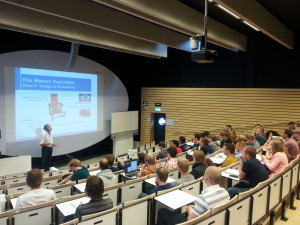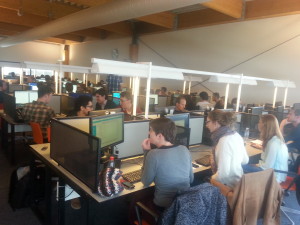The Human Controller – ’11-’20
The class “The Human Controller” was an MSc course given at the 3mE Faculty at TU Delft by David Abbink, until 2020. Its contents have been merged with Joost de Winter’s class Man-Machine Systems to the new Human-Robot Interaction class, given in the MSc Robotics. See below for a description of the original Human Controller lecture.
This lecture aims to provide knowledge about the human as a controller of vehicles and robotic tools, which can then be used  in the design and evaluation of human-machine interaction. The class consists of several lectures and three practical assignments.
in the design and evaluation of human-machine interaction. The class consists of several lectures and three practical assignments.
The course is very well appreciated by students, due to the multidisciplinary approach to understanding human control behavior, which links theory to societal relevance and practical applications. Responsible teacher David Abbink provides enthusiastic and inspiring lectures and was selected best teacher of the BioMechanical Engineering Department for seven years straight (2011-2017) and best teacher of the faculty (2013 and 2014).
The course has been recorded to be available online, so that students of Delft University of Technology can view the class of spring 2014 on Collegerama.
Additionally, visitors from outside are able to access the course as OpenCourseWare, which includes one of the practical assignments that you can download and perform at home. For this, the course has received international recognition from the Open Education Consortium, a world-wide association of more than 250 universities that promote Open Education. The Human Controller course won an Open Education Award for Excellence, in the category Outstanding Course.
Learning goals
After this course, students must be able to:
- Reproduce important concepts on the physiology behind human perception, cognition and action
- Apply existing techniques to measure and model human behavior when interacting with vehicles or tools
- apply McRuer’s crossover model to a simple manual control task, and reflect on the pro’s and con’s of this modeling approach
- reflect on the balance between an operator’s performance of a task and the control effort to realize that performance
- Critically reflect

- on how knowledge of human behavior can help the design of new human-machine interfaces
- on different roles of humans when interacting with machines (e.g. discussion of manual control vs automation)
- on different ways to measure and model human behavior
- on short term vs long term effects of support systems
- Co-operate in small groups with the final goal of reporting experimental findings with a written 4-page report, as well as with an oral presentation (these will be part of the assessment, as well as a written exam).
The responsible teacher is David Abbink, PhD students and postdocs of the lab helping out with lectures and practical assignments.